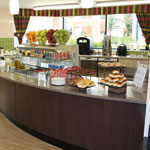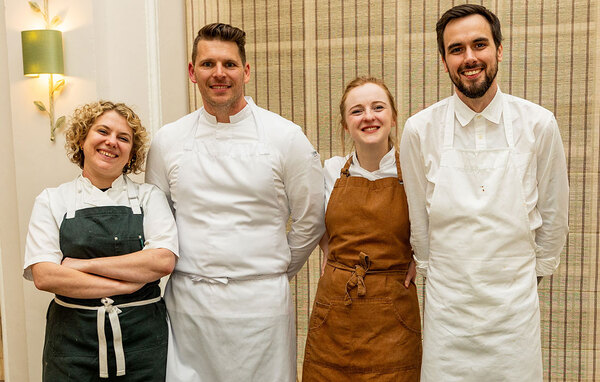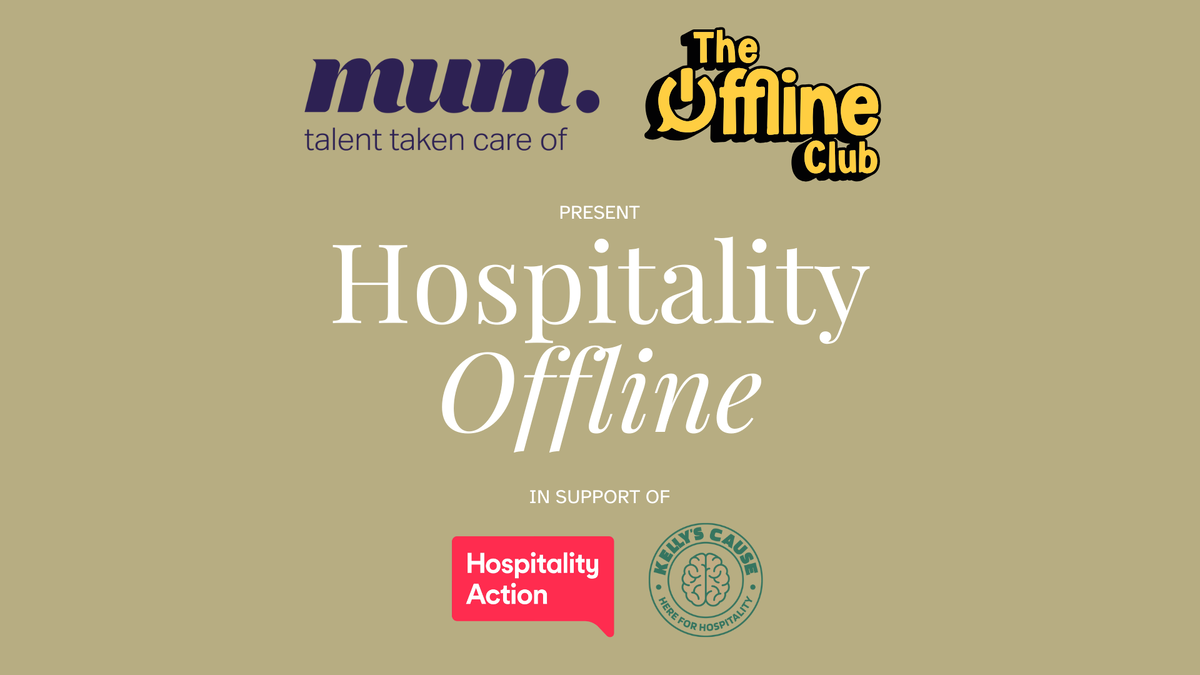Catering with care
In 2010, one in 10 elderly people in the UK were at risk from malnutrition. As awareness of this issue increases, contractors are increasingly being called on to deliver specialised catering services to residential care homes. Elly Earls finds out about the unique challenges involved
Some 10% of elderly people in the UK were found to be at risk from malnutrition in October 2010 according to a report by the National Association of Care Catering (NACC). With figures showing that by 2033 an estimated 23% of the population will be aged over 65 and a further 3.2 million people will be over 80, it's a problem that needs to be addressed.
Traditionally, care home catering was carried out by the operators of the establishment; none of it was outsourced. But over the past two to three years, with nutrition coming under the spotlight, the market has started opening up.
"The Care Quality Commission's [CQC] Collaborative Nutrition Tool is now being used in the care home market, and people in the industry with no knowledge of catering are starting to realise that somewhere down the line they need access to catering professionals," explains Derek Johnson, chair of the NACC.
Over two-thirds of care home residents have dementia, a condition that is becoming more widespread. "Thirty years ago, dementia could start in your late 60s or early 70s, but now we see cases of people in their 50s," notes Paul Robottom, managing director of specialist caterer to the care and welfare sector, Caterplus Services.
"Care home contract catering is a growing business and the earlier onset of dementia is going to have a big impact on this."
The first signs of dementia are loss of memory and appetite, making the first stumbling block for caterers getting the residents interested in the food that's put in front of them.
"It's a challenge to make sure the dishes are well-prepared, well-presented and attractive to the eye," confirms FCSI consultant Peter Pitham, managing director of the Catering Consultancy Bureau.
Another common condition encountered in care homes is dysphagia (difficulty swallowing), something Apetito, a catering organisation specialising in care homes, local authorities and hospitals, has really taken on board.
"Our latest innovation is an award-winning puréed meals range," says Lee Sheppard, the company's care homes divisional manager. "Dysphagia is a growing issue for many care homes, but there is still an inherent lack of knowledge about how to help residents enjoy proper, nutritional food intake as well as allowing them to dine with dignity."
For Phil Tyas and Tim Smith, co-owners at TNS Catering, it's equally important to remember that more and more lucid senior citizens are opting into the care home environment. Johnson agrees: "The services in lots of places are getting up to hotel standards of food and that's what clients are expecting. People are looking for a good quality product and the variety of tastes is changing."
According to FCSI consultant Andrew Etherington, it's about leaving behind your preconceptions of catering for the elderly. "Old people do still have a very discerning palette; they want something that's a bit more than home cooking but not too far from it. The comfort factor that comes from a home-cooked meal is very strong," he remarks.
In contrast to hospital caterers, care home contractors are essentially cooking food in residents' homes, something Robottom feels is often forgotten.
"We have to give residents dignity and respect, but sometimes people don't understand that side of the business," he explains.
Similarly, at TNS Catering, the team approaches care home catering like looking after a family and much emphasis is placed on empowering the residents as individuals and making sure they are involved in the decision-making process.
The challenge then becomes balancing the clients' wishes with the nutritional requirements set out by the CQC, and here lies the common denominator between care home and hospital catering. "Both sectors need good, wholesome, nutritious food to aid recovery," Pitham notes.
While there is some debate on the value of increasingly stringent nutritional standards with some, including Etherington, feeling that they are too prescriptive and take focus away from ensuring that the residents are at least eating something, the more widely-held view seems to be that the new nutritional guidelines bring a much-needed consistency to the industry.
"As the CQC gets to grips with the nutrition tool, it's going to push the standards up and get people to really look at their food," Johnson predicts. "At last there's a tool out there for the inspectors to use."
Offering a personal service

"In a care home of 50 people, you're probably making 20-30 different meals every lunch time," he says. "It's fundamentally important that the chef's team has a good knowledge of each and every resident, that they know them as people and know their dietary needs."
The company also offers cleaning, security and reception services to care homes; in these areas, personal service is equally important. "The people cleaning the individual resident rooms are a critical part of the culture, chemistry and fabric of care home life for the residents," Hammond notes.
In terms of specific innovations, Elior offers pictorial menus to guests suffering with dementia as well as ‘smart pads', which is a pictorial menu on a touch screen.
Moreover, the Provision Plan food box (a plastic box containing items such as celery or carrot sticks, personalised for each resident and stored near their room), which has been endorsed by the Alzheimer's Society and accredited by Age UK, enables carers to have access to nutritional foods whenever the resident wants them.
NACC Training and Development Forum
The NACC National Training and Development Forum is a two-day annual event aimed at caterers in the care sector, which highlights the latest innovations in the industry and invites high profile speakers from around the world to speak on current catering affairs.
"The members themselves decide which areas are coming up and we develop the programme around that," says Derek Johnson, chair of the NACC. "It's a place to network, share information and pick up good ideas."
Topics covered at this year's forum, which took place from September 14-16, included government funding, good nutritional care, food safety incidents and difficulties with communication and swallowing, with speakers present from the Professional Association of Catering Education (PACE), the Beth Johnson Foundation and the Dorset and Leicestershire County Councils, among other organisations.
On top of its annual forum, the NACC also offers a huge range of resources for both carers and caterers, including a catering checklist. In November the association hopes to launch its guidance on the new CQC nutrition tool.
The changing face of care catering

Caterplus recruited a PhD student from King's College to do some scientific study on dementia with one of the large national care home groups the company caters for and found that if residents can achieve weight gain, it is a major contributor to improving their memory.
"One of the biggest issues is trying to get people enticed to eat again, so we created the ‘bento box', which is like an airline tray but with 15 segments filled with foods such as grated cheese or carrots. The residents can graze on it throughout the afternoon in the lounge," Robottom explains.
Caterplus is also working in the Extra Care sector, with clients such as McCarthy and Stone and Guinness Hermitage, and Robottom feels that this is the real growing market right now. "Residents can still have their independence, but also the facility of a restaurant. The key there is making it commercial. People are paying cash for it so it's got to be good quality."
Top tips on working in the care home catering market
â- Treat residents with dignity and respect and always remember you are cooking food in somebody's home.
â- Personalise your catering service. Monthly residents' meetings are a great way to engage and empower your customers and you'll be surprised at how constructive their comments are. You can also foster independence by allowing residents to serve themselves if it is safe to do so.
â- Encourage residents to drink sufficient quantities of liquid by situating water coolers around the care home. You can take it one step further by dispensing fruit juice from some of these machines, giving the extra benefit of providing nutrition and calories.
â- Engage with the care staff at the care home so there is a strong partnership between the food team and the caring team. Communication between back of house and front of house is essential, as well ensuring that each member of the team has a genuine sense of passion for their work.
â- Make sure you understand each and every resident - that includes who they are as a person and their food and drink needs.
â- Prepare well-balanced menus using fresh ingredients, perhaps with the help of a nutritionist.



















